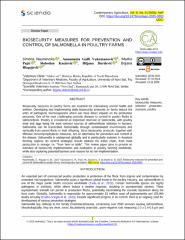Biosecurity measures for prevention and control of Salmonella in poultry farms

View/
Date
2025Author
Naumovska, Simona
Galfi Vukomanović, Annamaria
Pajić, Marko
Knežević, Slobodan
Đurđević, Biljana
Blagojević, Bojana
Metadata
Show full item recordAbstract
Biosecurity measures in poultry farms are essential for maintaining animal health and
welfare. Developing and implementing daily biosecurity protocols on farms reduce the
entry of pathogenic microorganisms which can have direct impacts on the production
processes. One of the most challenging zoonotic diseases to control in poultry flocks is
salmonellosis. Poultry is considered an important reservoir of Salmonella, with poultry
meat and eggs being the most common sources of salmonellosis infection in humans.
Salmonella can be transmitted horizontally through contaminated environments and
vertically from parent flocks to their offspring. Strict biosecurity protocols, together with
effective immunoprophylactic measures, are an alternative for prevention and control of
the disease. Salmonella is widespread globally and is particularly endemic in livestock
farming regions. Its control strategies should address the entire chain, from meat
production to storage, i.e. "from farm to table". This review paper aims to provide an
overview of biosecurity implementation and evaluation in poultry farming worldwide,
while also exploring potential barriers and reasons for its non-implementation.
